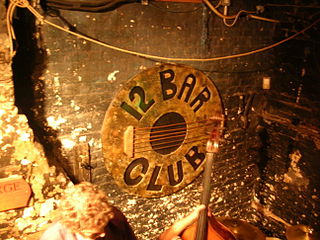 W
WThe 12 Bar Club was a music venue in London that opened in 1994 on Denmark Street – known as Great Britain's "Tin Pan Alley" – just off Charing Cross Road and close to Soho.
 W
W56a Infoshop is a self-managed social centre, archive, and shop based in Elephant and Castle, Southwark, London. Its collection centres around left and far-left materials including information on anarchism, anti-gentrification, to squatting.
 W
W78 Lyndhurst Way was a squatted artist-run space in a Grade II listed Victorian-period house in Peckham, London between 2006 and 2007.
 W
W102 Eaton Square is a Grade II* listed house in Eaton Square, Belgravia, central London.
 W
WThe 491 Gallery was a squatted self-managed social centre and multi-disciplinary gallery in Leytonstone, London, England, that operated from 2001 to 2013. Taking its name from its street number, 491 Grove Green Road, the former factory was home to a community-led art organisation and served as an exhibition space for a diverse range of artists of different origins working in varied media. It contained a range of art and music studios, which were used to host workshops, classes and musical rehearsals. The building was subsequently demolished in 2016.
 W
WArgyle Street was a Victorian terraced street in Norwich, Norfolk. It became a squat lasting from 1979 to 1985. The street was then demolished in 1986. Some of the newbuild houses were subsequently demolished in 2015.
 W
WThe Bank of Ideas was a squatted, self-managed social centre in a disused UBS office complex on Sun Street in the City of London, England. It remained in the building from November 2011 until January 2012. The building was owned by UBS, and the squatters were members of the Occupy London protest movement. The building was described by an Occupy London spokesman as "a space for political discussion".
 W
WBloomsbury Social Centre was the name given to a building in Bloomsbury, London, which was squatted as a self-managed social centre by students in affiliation with Occupy London, and the global Occupy movement. It was occupied on Wednesday, 23 November 2011, and evicted on Thursday, 22 December, lasting a total of 30 days. It was situated at 53 Gordon Square, in an historic six-storey Georgian Grade II-listed building, renovated by famous British architect, Charles Holden, the principal architect of nearby Senate House.
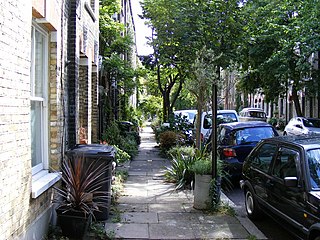 W
WBonnington Square is a square in Vauxhall, south London, which was built in the 1870s. It became famous in the 1980s when all the houses in it, vacant and awaiting demolition, were squatted.
 W
WBrunswick House is a large Georgian mansion in Vauxhall, in the London borough of Lambeth.
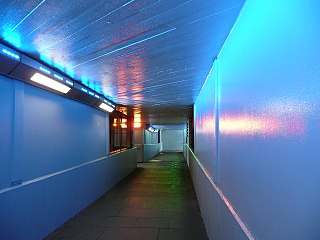 W
WCardboard City was the name for an informal settlement consisting of temporary cardboard shelters that occupied a site near Waterloo station in London, England. Cardboard City, was lived in by homeless people from around 1978 until 1998, and was eventually closed after a High Court order led to it’s redevelopment.
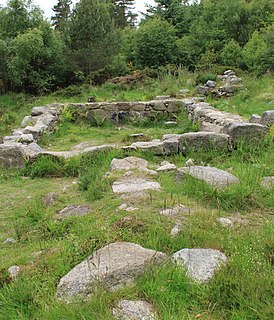 W
WThe Colony was a squatters' community on "commonty", or common land, on one side of Bennachie, a range of hills near Aberdeen, in Scotland.
 W
WCornwall Terrace is a Grade I listed building of consecutive terraced mansions overlooking Regent's Park in the City of Westminster, London. It is situated at the park's southwest corner, near Baker Street, between York Terrace and Clarence Terrace, within the park's Crown Estate development. Cornwall Terrace was part of the scheme of the Prince Regent, later King George IV, to develop grand housing in Regent's Park. The buildings are Grade I listed buildings.
 W
WDial House is a farm cottage situated in south-west Essex, England that has been a self-sustaining anarcho-pacifist open house since 1967. The house is located in the countryside of Epping Forest in Ongar Great Park, an area covering 5-by-3 kilometres. Dial House is an intentional community and the home of the anarcho-punk band Crass.
 W
WEel Pie Island is an 8.935-acre (3.6 ha) island in the River Thames at Twickenham in the London Borough of Richmond upon Thames. It is on the maintained minimum head of water above the only lock on the Tideway and is accessible by boat or from the left bank by footbridge. The island had a club that was a major venue for jazz and blues in the 1960s.
 W
WExodus Collective was a community collective and sound system formed in 1992, in the Marsh Farm area of Luton, England. It organised free parties and became involved in housing, social exclusion, and community projects, founded upon the principle of DIY culture. The group squatted buildings and repeatedly came into conflict with Bedfordshire Police, which by 1995 had resulted in Bedfordshire County Council voting for a public inquiry into alleged police harassment. The license of a pub owned by the mother of people in the collective was revoked, a decision which was later overturned by a judicial review.
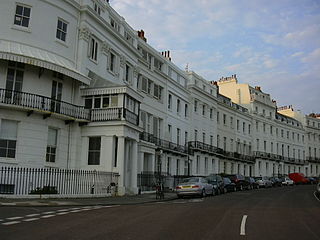 W
WFife House, No 1, Lewes Crescent, is a Grade I listed building in Kemp Town, Brighton, United Kingdom, which was previously owned by the Duke of Devonshire and the Duke of Fife.
 W
WThe Forest, also referred to as Forest Café, is an independent social centre and arts centre, located on Lauriston Place, central Edinburgh, Scotland. It is notable for being run by volunteers as a charitable self-sustaining not-for-profit. Forest cafe was previously housed in the former Edinburgh Seventh Day Adventist Church, a building owned by the Edinburgh University Settlement until August 2011, and housed the café, an arts gallery, performance space, rehearsal/music studio, and darkroom specialising in Alternative photographic process. In August 2012 the Forest reopened in Lauriston Place, Tollcross, where it continues its activity as a volunteer-run vegetarian cafe with regular free events and workshops, assuming a pivotal role in the revival of the independent community development in central Edinburgh.
 W
WThe Four Aces Club was a pioneering music and recreational space on Dalston Lane in Hackney, London. Based in a building that had formerly been the North London Colosseum and Amphitheatre and then a cinema, in the 1960s and 1970s the club became one of the first venues to play black music in the United Kingdom. It was credited with playing a significant "role in the evolution of reggae into dance music, from ska, to rocksteady, to dub, to lovers, to dancehall and the evolution of jungle." Many notable Afro-Caribbean musicians appeared at the Four Aces, which was often referred to as "the jewel in Dalston's crown". As well as reggae and dub artists, its clientele over the years including stars such as Bob Marley, Stevie Wonder and Jimmy Cliff.
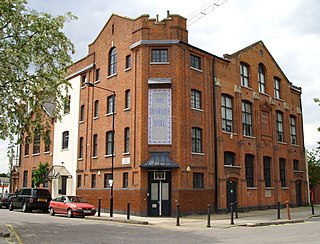 W
WFrestonia was the name adopted by the residents of Freston Road, London, when they attempted to secede from the United Kingdom in 1977 to form the Free and Independent Republic of Frestonia. The residents were squatters, many of whom eventually set up a housing co-op in negotiation with Notting Hill Housing Trust, and included artists, musicians, writers, actors and activists. Actor David Rappaport was the Foreign Minister, while playwright Heathcote Williams served as Ambassador to the United Kingdom.
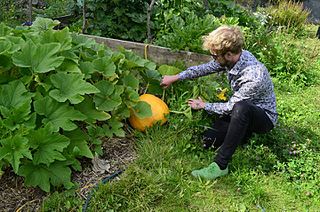 W
WGrow Heathrow is a land squat and community garden in Sipson, west London. It was occupied in 2010 by local people concerned about the possibility of the expansion of Heathrow Airport. It is part of the Transition Network. Half of the site was evicted in 2019.
 W
WHounslow Community Land Project was a community garden and sports area on a derelict piece of land on Hanworth Road, Hounslow, west London. The site, owned by Transport for London, had been occupied by a group of land rights activists who have set up a camp and created a football pitch, badminton court, wildlife pond and vegetable growing areas.
 W
WHulme is an inner city area and electoral ward of Manchester, England, immediately south of Manchester city centre. It has a significant industrial heritage.
 W
WJones' Hill Wood is a 1.8-hectare (4.4-acre) piece of ancient woodland near Wendover in Buckinghamshire, south England. Formed mainly of beech trees, the wood is part of the Chiltern Hills Area of Outstanding Natural Beauty. Almost half of the wood is planned to be chopped down to make way for the route of High Speed 2 (HS2) and the topsoil will be translocated. In October 2020, a protest camp was evicted.
 W
WThe M11 link road protest was a campaign against the construction of the M11 link road in east London in the early to mid-1990s. "A12 Hackney to M11 link road", as it was officially called, was part of a significant local road scheme to connect traffic from the East Cross Route (A12) in Hackney Wick to the M11 via Leyton, Leytonstone, Wanstead and the Redbridge Roundabout, avoiding urban streets.
 W
WThe Manchester Stock Exchange, also known as the Northern Stock Exchange, is a Grade II listed building at 2–6 Norfolk Street, Manchester. It was built between 1904 and 1906 by Bradshaw, Gass and Hope, the Bolton architectural practice responsible for many of Manchester's iconic buildings such as the Royal Exchange. The first stock exchange in Manchester opened in 1836, and its function was to raise capital through joint stock issues for manufacturers, mineral extractors and railway companies. It cost £86,000 to build.
 W
WMedina House is a former Turkish bath on the seafront of Hove, Sussex, England. After falling into disuse it was squatted for several years. During this period Sirus Taghan, the then owner, agreed that the occupants could remain, so long as the property was kept in the same condition as before occupation. It was finally evicted in September 2006, although it was re-occupied for a week at the end of January 2007.
 W
WThe Newbury bypass, officially known as The Winchester-Preston Trunk Road (A34) , is a 9-mile (14 km) stretch of dual carriageway road which bypasses the town of Newbury in Berkshire, England. It is located to the west of the town and forms part of the A34 road. It opened in 1998.
 W
WOccupy London was a movement for social justice in London, England, and part of the international Occupy movement. While some media described it as an "anti-capitalist" movement, in the statement written and endorsed by consensus by the Occupy assembly in the first two days of the occupation, occupiers defined themselves as a movement working to create alternatives to an "unjust and undemocratic" system. A second statement endorsed the following day called for "real global democracy". Due to a pre-emptive injunction, the protesters were prevented from their original aim to camp outside the London Stock Exchange. A camp was set up nearby next to St Paul's Cathedral. On 18 January 2012, Mr Justice Lindblom granted an injunction against continuation of the protest but the protesters remained in place pending an appeal. The appeal was refused on 22 February, and just past midnight on 28 February, bailiffs supported by City of London police began to remove the tents.
 W
WOval Mansions are eight separate blocks of tenement housing in Kennington, south London. The blocks stand between the Oval cricket ground and the Oval Gasholders. After being occupied by one hundred squatters from 1983 until 2000, the buildings were sold off by Lambeth Council in the early 2000s.
 W
WPassing Clouds was a community run music venue near Kingsland Road, Dalston in East London. Founded in 2006, the venue was used for a range of activities. It was closed down in 2016, squatted and then finally evicted. After a period of dereliction it was announced in 2019 that it would re-open as a different venue.
 W
WRaven's Ait is an ait (island) in the Thames between Surbiton, Kingston and Hampton Court Park in the Royal Borough of Kingston upon Thames, London, England, in the reach of the river above Teddington Lock. Used as a boating training centre for many years, Raven's Ait is currently privately run as a catering facility and a conference and wedding venue.
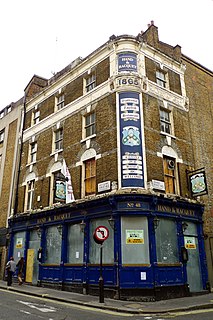 W
WThe Really Free School was a collective squatting a series of buildings in central London in 2011. They organised lectures and workshops, stating "in this space, aside from the fact that you will not spend one penny inside these doors, you can also come and engage in a collective learning process directed by your own desires, ideas, questions and problems."
 W
WThe Sir George Robey was a mid-19th century public house and later a music venue on Seven Sisters Road, Finsbury Park, North London, England. It was named in honour of the music hall performer Sir George Robey (1869–1954) in 1968.
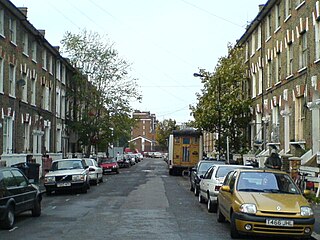 W
WSt Agnes Place was a squatted street in Kennington, south London, which resisted eviction orders for more than 30 years. When a number of derelict houses were scheduled for demolition to extend Kennington Park in 1969, squatters occupied the properties and a High Court injunction prevented the demolition. The street was run by a housing cooperative until 2005, when Lambeth London Borough Council obtained an eviction order. Demolition was completed in 2007.
 W
WSutton House is a Grade II* listed Tudor manor house in Homerton High Street, in Hackney and is in London Borough of Hackney, London, England. It is owned by the National Trust.
 W
WTitnore Wood is an area of ancient woodland to the north-west of Worthing in West Sussex. With neighbouring Goring Wood it forms one of the last remaining blocks of ancient woodland on the West Sussex coastal plain.